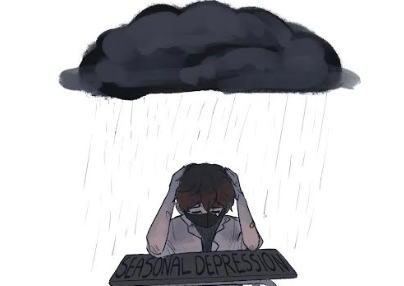Overcoming the winter blues

Seasonal affective disorder is a very common form of depression, affecting over three million Americans per year.
April 18, 2023
Winter can be a challenging time for many—people feel stressed, move around less and struggle with motivation. This phenomenon is commonly known as “the winter blues.” However, there is a lesser known condition that involves more severe mood changes and affects millions of people around the world.
Seasonal Affective Disorder (SAD), commonly known as seasonal depression, is characterized by significant changes in mood or behavior during certain seasons. This occurs most commonly during winter months and usually goes away during the summer. A less common type, summer SAD, occurs as well, where changes in mood occur during the summer and go away during the winter.
According to the National Institute of Mental Health (NIMH), scientists haven’t found a definite cause of SAD, but research links it to reduced serotonin activity in the brain. Serotonin regulates mood and attention and can be destabilized by a lack of sunlight.
SAD has also been linked to an overproduction of melatonin, which maintains the sleep cycle. Changes in serotonin and melatonin levels disrupt normal sleep and behavior routines, which are common effects of SAD.
Symptoms include having low energy or difficulty concentrating, oversleeping and social withdrawal among others. These can be similar to symptoms of depression, although they vary from person to person.
A John Hopkins article explained that typical treatments are “exposure to sunlight, light therapy, psychotherapy and antidepressants.”
Light therapy is exposure to bright light, while psychotherapy is a form of cognitive-behavioral therapy that improves interpersonal skills and identifies ways to deal with stress.
The NIMH recommends that people who may be suffering from SAD talk to their health care provider or mental health specialist. RM also has various services available to students.
“Services [are] offered through the Wellness Center, the work of our school counselors or psychologist or social worker, RM Minds Matter student club, advisory lessons, Signs of Suicide lessons and [the] work of the Wellness Committee,” school psychologist Dr. Lisa Nesson said.
Students can also take matters into their own hands by setting realistic goals, confiding in others, regularly exercising and eating balanced meals.
“Small things can definitely be important,” freshman Chloe Kennedy said. “Talking with others, especially your friends, can help you see things from another angle.”
Other helpful resources can be found on the Student and Family Support and Engagement tab on the MCPS website.


